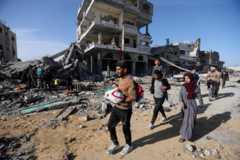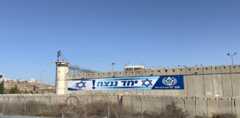Sixty lorries carrying medical supplies, fuel and food have made their way into Gaza from Egypt, after a four-day pause in fighting by Israel and Hamas comes into effect
- Under the deal - which has been mediated by Qatar - 13 Israeli hostages are due to be released later today, with 50 being released over the four days. As part of the agreement, Israel will release 150 Palestinian prisoners.
- Small arms and mortar fire, as well as an air strike, were heard by a BBC reporter close to Gaza moments before the pause was due to come into effect.
- UK Foreign Secretary David Cameron is meeting Palestinian leaders today, and says Britain is looking into all avenues to get support into Gaza
- Hamas’s attacks on 7 October killed 1,200 people and saw about 240 taken hostage
- Since then, Gaza's Hamas-run health ministry says more than 14,000 people have been killed in Israel's retaliatory campaign.
We're now just over six hours into an expected four-day temporary pause in fighting between Israel and Hamas. Here’s what has been happening so far:
- At 07:00 local time (05:00 GMT), the Qatar-brokered deal between the two sides came into force
- At the heart of this deal is the release of hostages. If all goes to plan at 16:00 local time, the release of the first group of hostages - expected to be 13 women and children - will be brought back from Gaza
- This truce is supposed to last for a further three days
- Palestinians displaced from the northern Gaza Strip have been warned by the Israel Defense Forces not to attempt to return home
- There have already been reports of Palestinians being shot at as they tried to move north
- As part of the deal, 200 lorries carrying medical aid, food and water are also supposed to cross into Gaza every day
- Humanitarian supplies began to arrive earlier this morning but aid agency Oxfam was quick to point out that it would not be "nearly enough".
Large banners hang on the walls of Ofer prison complex in the occupied West Bank – the words “United we will succeed!” picked out in large blue and white letters, alongside the Israeli flag.
Later today, 39 Palestinian prisoners are due to arrive here, released from Israeli jails in exchange for 13 hostages held by Hamas.
The 39 prisoners will be chosen from a list of 300 women and young people compiled by Israel, accused of a range of offences, from throwing stones to attempted murder.
The vast majority of them are being held without trial. Most of those listed are teenage boys – with 40% under the age of 18.
Families of the 39 prisoners due for release today will gather later at a nearby checkpoint to receive them.
Human rights organisations say the number of Palestinians held without charge in Israeli jails has shot up since the 7 October attacks.
There are now thought to be more than 6,000 Palestinians held by Israel on security grounds – many still awaiting trial.
Almost every Palestinian family in the West Bank is thought to have had a relative detained by Israel at some point in the past – often in jails inside Israel, making it difficult or impossible for their relatives to visit.
Palestinian news agency Wafa reports that at least seven people have been injured after being shot while attempting to head into north Gaza.
Eyewitnesses in the Wadi Gaza area say Israeli troops targeted people trying to return home, according to Wafa.
Israel has previously said it would not allow people to return to north Gaza during the pause in fighting, as it says the area is still an active warzone.
The Israeli military says it is looking into the reports.
There is absolutely no guarantee that any cessation in hostilities will extend to the Israeli Lebanese border.
Neither Hezbollah nor Israel in the north are party to the cessation in hostilities in and around Gaza and there is no mechanism actually for talks between Hezbollah and the Israelis.
I've been speaking to the United Nations on the border who patrol and try to keep the peace along the so-called blue line.
They have a hope, but not an expectation that what is happening in Gaza may be temporarily replicated on that very fragile border between Israel and Lebanon.
There’s been clashes and fighting on and around that border ever since 8 October, in direct response to what happened in and around Gaza.
The one thing about the present clashes is that they have been taking place five or six kilometres either side of the border, right along the border. And the big fear, according to the UN, is that this conflict will explode much deeper into both countries.
EVEN MORE DETAILS AT: https://www.bbc.co.uk/news/world/middle_east



No comments:
Post a Comment